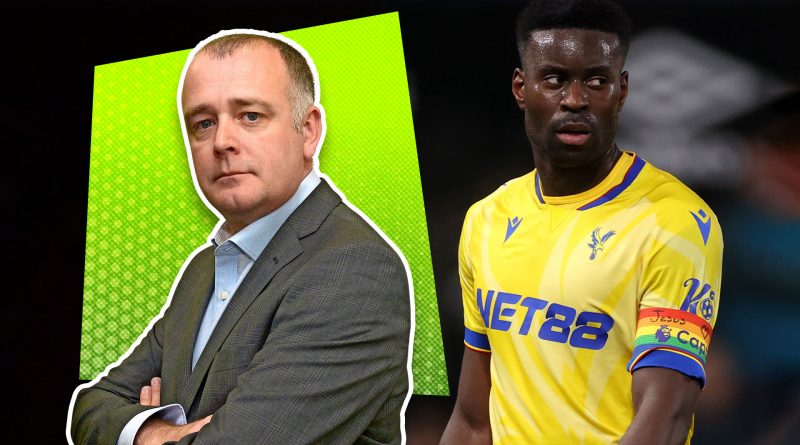The FA Has Once Again Entered a Rabbit Hole of Absurd Double Standards in the Morsy and Guehi Rainbow Armband Controversy
Remember two years ago during the World Cup in Qatar?
At that time, the FA and Harry Kane proclaimed that the England captain would wear a rainbow armband to support the LGBTQ+ community, particularly after FIFA assigned hosting rights to a country that criminalizes homosexuality.
Other six Western European nations were prepared to make the same statement.
That was until FIFA made it clear that captains engaging in this “political” statement would face penalties.
Once it appeared that such a gesture might have actual sporting repercussions—making it far more significant—
the FA and their six counterparts performed a sudden reversal. They backed down.
This is the reality of English football and its supposed “support” for the LGBTQ+ community.
They seem willing to express their support through symbolic but empty acts, while true meaningful gestures remain absent.
Fast forward two years, and the FA finds itself in another controversy, allowing Ipswich captain Sam Morsy—a practicing Muslim—not to wear a rainbow armband while reprimanding Crystal Palace’s Marc Guehi—a devout Christian—for inscribing his armband with ‘I love Jesus’ and repeatedly stating “Jesus Loves You.”
This is clearly absurd. It blurs discrimination with the justification of “rules are rules.”
English football sought to protest the hosting of the World Cup in Qatar.
Yet when it comes to Newcastle’s funding by the Saudi regime—which oppresses women and punishes homosexuality— or the Abu Dhabi government’s support for Manchester City, they choose to ignore it.
When England defender Guehi, son of a Christian minister, took his stand during the Saturday 1-1 match against Newcastle, visiting captain Bruno Guimaraes properly wore his rainbow armband.
However, the regime employing him evidently does not uphold the values this armband supposedly stands for.
By sheer luck of the fixture schedule, Guehi and Morsy—born in Britain and an internationally recognized Egyptian player—faced off against each other on Tuesday, further emphasizing the absurdity of one player being allowed to abstain from wearing an armband, while the other was reprimanded for writing on his.
Moreover, Manchester United’s Muslim defender Noussair Mazraoui declined to wear a specially-designed pre-match warm-up jacket for the club’s Rainbow Laces match against Everton.
Consequently, United decided against having any players wear the jackets to maintain team unity.
Thus, their desire to support LGBTQ+ rights faded when it became challenging.
A Lot of Work to Be Done
I count myself fortunate to have been raised without any religious influence, fundamentally believing that organized religion causes more harm than good.
Nonetheless, I acknowledge that individuals like Guehi, Morsy, Mazraoui, and anyone with faith have every right to practice as they wish.
I also believe in the underlying principle of the rainbow campaign.
That everyone should have the freedom to love whom they choose without fear of judgment.
In a progressively secular world, this straightforward idea resonates with most individuals.
Inclusivity should not be a taboo term. LGBTQ+ individuals have justifiably felt alienated from participating in football and attending matches.
Sometimes It’s Meaningless
The reality that there are still no openly gay footballers in the Premier League demonstrates that much remains to be accomplished.
However, when campaigns are muddied by the FA’s retreat in Qatar and the double standards regarding Guehi and Morsy, they inadvertently fuel the prejudices of intolerant individuals and negate their own intentions.
They lend credence to the perception that the FA is overly “woke,” when that’s not entirely accurate.
The FA, along with English football as a whole, is merely eager to embrace everyone and everything at all times.
It’s unusual to attend an England match without a minute’s silence, which usually culminates in applause.
This is often in honor of a recently deceased former England player or manager alongside the victims of some tragedy or natural catastrophe abroad, rendering it essentially devoid of meaning.
Opposite of ‘Wokeness’
It’s also odd that before each England match, around 100 active military personnel grace the pitch.
Even stranger was last month’s game against the Republic of Ireland, where the local populace understandably doesn’t appreciate the sight of British soldiers in uniform.
This experience is genuinely contrary to the idea of “wokeness”—whatever that term signifies—and quite jarring in its dichotomy.
Then there’s Remembrance Day. I tend to wear a poppy—or more accurately, I purchase several and then misplace them—all as a personal tribute to my relatives who served and died, recognizing my own luck in avoiding such horrors that my grandfather and great-grandfather endured.
Yet football has taken Remembrance Day to excessive levels, with The Last Post played, and moments of silence observed as early as October.
And it even permits James McClean, an open supporter of IRA terrorism, to voice his opinions—views that are repugnant to most of us.
Gesture politics in football have transformed into a perplexing moral labyrinth, exemplified by the absurdities surrounding Guehi and Morsy.
In a nation rife with anger and division, the logical takeaway is that football should be a sanctuary—removed from politics, religion, the military, and any other agenda.




